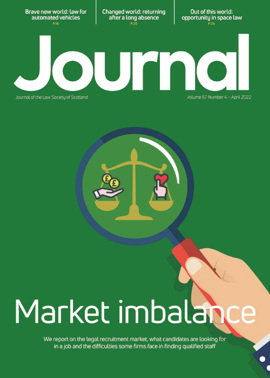Licensing: tighter rules for the pet trade
 April 2022 is National Pet Month. This is a month which celebrates our furry and non-furry friends and raises awareness of responsible pet ownership across the UK.
April 2022 is National Pet Month. This is a month which celebrates our furry and non-furry friends and raises awareness of responsible pet ownership across the UK.
The process for becoming a pet owner can vary from adoption, to rescue, to purchasing from a breeder. The Animal Welfare (Licensing of Activities Involving Animals) (Scotland) Regulations 2021, which came into force on 1 September 2021, were introduced to regulate activities right across this spectrum and plug holes in what was considered outdated and flawed legislation. The pandemic saw pet ownership increase exponentially. The internet is flooded with adverts for cute animals, prices are soaring, and news sources are sadly just as full of appalling reports of puppy farming scandals. It would appear to be the perfect time for Scotland to catch up with England and introduce a more robust and wideranging system for the protection of animals in these settings.
The new regulations replaced previous legislation dealing with pet sales and dog breeding and introduced new licensing requirements for cat and rabbit breeders, animal welfare establishments (such as animal sanctuaries and rehoming centres) and other pet rehoming activities, subject to operators meeting the licensing criteria for each activity. For solicitors in private practice the changes may result in more enquiries from those looking for support, particularly as current licences come to an end under transitional provisions. For local authority solicitors the administrative burden will almost certainly increase, as the scope for licensing has been significantly widened.
Licensing requirements
Under the legislation a person must not carry on a licensable activity without the authority of a licence. A licensable activity is defined as selling animals for pets in the course of a business, animal rehoming, operating an animal welfare establishment, or breeding in a 12 month period three or more litters of kittens or puppies, or six or more litters of kits (rabbits). For the first time, cats and rabbits have been brought within the scope of the licensing regime, and the requirement for those breeding dogs to be authorised has been extended to apply to those breeding three litters as opposed to five. Each local authority must also publish a register of licences granted by it, which will be a valuable resource and safeguard for those considering engaging with anyone holding themselves out to be legitimate.
On receipt of an application for a licence the local authority must instruct an inspector to visit the establishment which is the subject of the application and carry out a report, except where the application relates to a licence for rehoming activities: in such a case the inspection is discretionary. On receipt of the report, the local authority must approve the licence if satisfied that certain criteria are met, namely:
(a) the standard conditions which must be attached to every licence are likely to be met: these include, but are not limited to, record keeping, appropriate animal numbers, training, suitability of environments, food and welfare;
(b) any further licence condition which it intends to attach to the licence as it considers necessary for the purposes of securing the welfare of animals, is likely to be met; and
(c) the grant or renewal is appropriate, taking into account any report.
In considering whether the standard licence conditions and any licence conditions which it intends to attach to the licence are likely to be met, a licensing authority must take account of the applicant’s conduct, whether the applicant is a fit and proper person to be the operator of that activity, and any other relevant circumstances. The fit and proper person test is a familiar one for licensing practitioners. The introduction of this test makes it clear that conduct is a relevant licensing issue, which under the previous legislation was not the case.
Knowledge base
During the consultation stage of the legislation it was suggested that as part of its assessment of fitness, a local authority should have power to devise and administer a meaningful test for applicants for a licence, similar to that which taxi and private hire licence applicants undertake. This was never brought forward into the regulations, but the proposition that knowledge may form part of a rounded assessment of competence/fitness is still a valid one given the wide discretion afforded to local authorities. Also, while there is no scope for parties to make objections or representations to applications, it might be possible for information to be brought forward and relied on if it is considered relevant in determining fitness.
The additional scrutiny introduced by the regulations should ensure that the wellbeing of our most loyal companions is given a higher priority within a licensing system that has their welfare as the absolute central consideration.
Perspectives
Features
Briefings
- Criminal court: Thom bar still applies
- Licensing: tighter rules for the pet trade
- Insolvency: Transition from the COVID measures
- Tax: What did the Spring Statement bring?
- Immigration: Providing a home for Ukrainians
- Scottish Solicitors' Discipline Tribunal
- Property: RCI – what does it involve?
- In-house: Looking for a star







